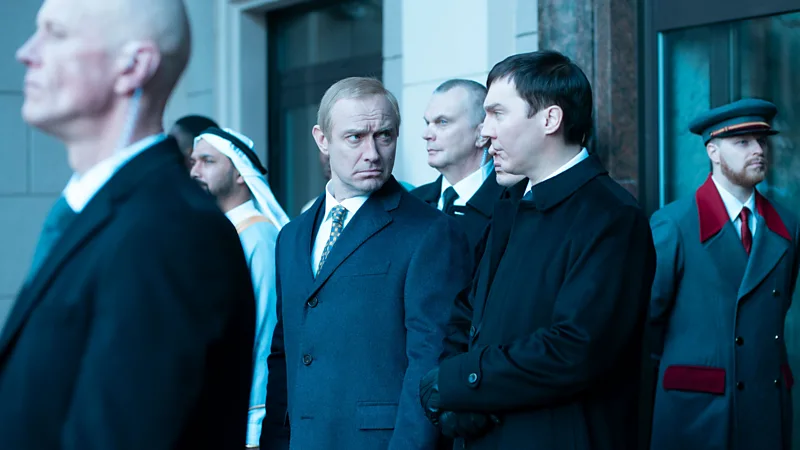The Wizard of the Kremlin: Jude Law’s Quietly Chilling Putin Headlines Venice Premiere
Venice — In Olivier Assayas’s provocative new political drama The Wizard of the Kremlin, which just premiered at the Venice Film Festival, Jude Law takes on the role of Vladimir Putin—but not the version most audiences might expect.
Far from the fiery tyrant he portrayed as Henry VIII in 2023’s Firebrand, Law’s Putin is a soft-spoken, composed figure—deliberate, restrained, and eerily unassuming. He speaks English with a polished British accent, and notably, he is not even the film’s central character. Instead, the spotlight belongs to Vadim Baranov, played by Paul Dano—a fictional political strategist inspired by Vladislav Surkov, the real-life Kremlin aide often described as the architect of modern Russian propaganda.
Adapted from Giuliano da Empoli’s 2022 bestselling novel, The Wizard of the Kremlin offers a chillingly plausible interpretation of how Putin rose to power in post-Soviet Russia—and how that power has been methodically shaped and preserved.
The film unfolds largely through Baranov’s reflections, as he recounts his journey to a visiting American academic (played by Jeffrey Wright). Once a young idealist studying theatre in the heady 1990s, Baranov quickly trades the stage for television, realizing he can wield greater influence by shaping public opinion through mass entertainment. His talents catch the eye of Boris Berezovsky (played with icy calculation by Will Keen), the notorious oligarch who helped engineer Putin’s ascent.
One of the film’s most darkly satirical moments shows Baranov and Berezovsky strapping a slumping Boris Yeltsin into a chair to make him appear competent on television, then dubbing in clips from past speeches to mask his current incoherence. “In politics, appearance is everything,” Berezovsky remarks—a line that echoes through the film like a warning.
But Berezovsky, ever the kingmaker, soon realizes Yeltsin’s reign is over—and that Russia is no longer interested in Western-style liberalism. “The country doesn’t want a supermarket,” he sneers. “It wants a fiefdom.” His solution? A hard-nosed, uncharismatic civil servant named Vladimir Vladimirovich Putin. “He’s no rocket scientist,” Berezovsky says, “but he’ll do just fine for now.”
Assayas’s direction leans into cold realism, resisting sensationalism in favor of quiet dread. The parallels to Hilary Mantel’s Wolf Hall are apt: this is a story not of kings, but of the brilliant, shadowy advisors who shape them. As with Mantel’s Thomas Cromwell, Baranov is a master manipulator, wielding power without ever appearing to seek it.
A Film of Subtle Power—and Warning
The Wizard of the Kremlin is less a traditional biopic than a meditation on power, illusion, and the machinery of authoritarianism. It’s a slow-burn thriller rooted in real events, yet told through the intimate lens of personal ambition and moral compromise.
For audiences looking to understand how modern Russia came to be—not just through brute force, but through psychological warfare and media manipulation—this film offers both insight and unease. Jude Law’s understated Putin doesn’t dominate scenes with outbursts or bravado. Instead, he unnerves with silence, calculation, and the calm of someone who knows he’s already won.
